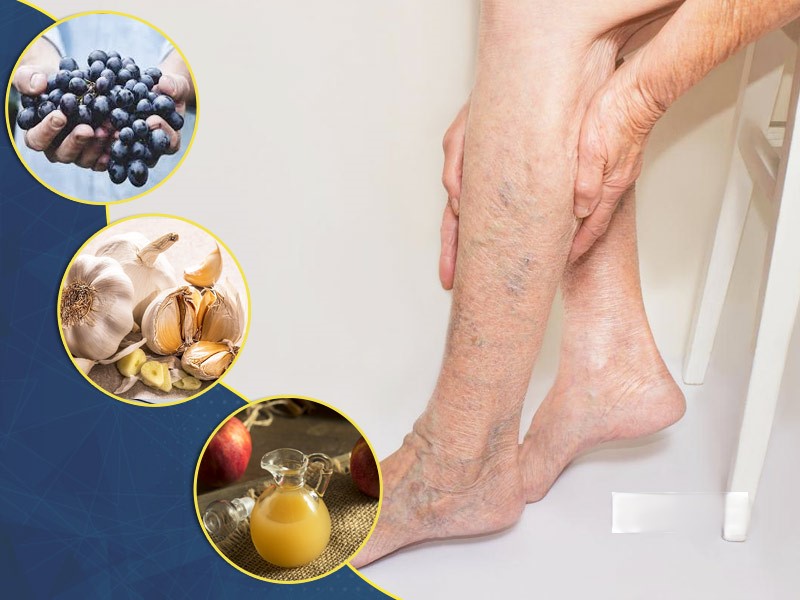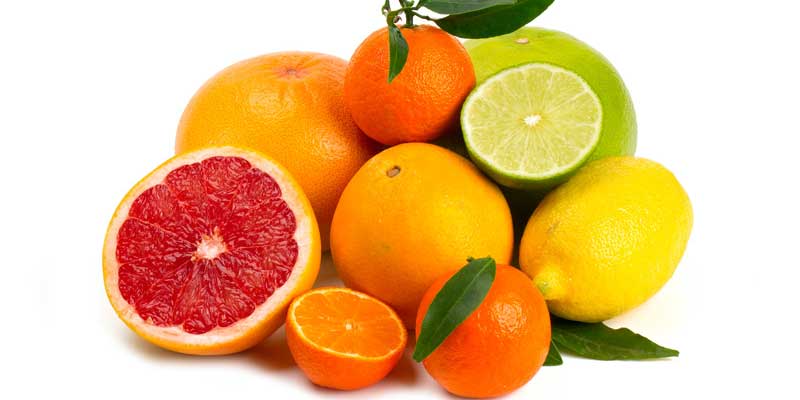Consumption of Citrus Fruits to Relieve Varicose Vein Symptoms
Varicose veins are a common condition characterized by twisted, enlarged veins that appear just beneath the surface of the skin, particularly in the legs. This condition occurs when vein valves become weak or damaged, leading to poor blood circulation and increased venous pressure. As a result, individuals experience symptoms such as pain, heaviness, swelling, and fatigue in the legs, which can negatively impact daily activities and quality of life.
The role of diet in managing varicose veins is significant, and one group of foods that have been found particularly beneficial is citrus fruits. Citrus fruits such as oranges, lemons, limes, grapefruits, and tangerines are rich in flavonoids, vitamins, and antioxidants that can support venous health, improve circulation, and alleviate the symptoms of varicose veins. This article will discuss the benefits of citrus fruits in managing varicose veins, how they work, and practical ways to incorporate them into your daily diet.

1. Citrus Fruits: A Nutritional Powerhouse for Venous Health
Citrus fruits are not only refreshing and delicious but are also packed with a range of nutrients that are beneficial for overall health, including venous health. They are rich in flavonoids, vitamin C, fiber, and essential antioxidants—all of which contribute to the health of veins, reduction of inflammation, and prevention of blood pooling in the legs.
a. Flavonoids in Citrus Fruits
Flavonoids are natural plant compounds that have powerful antioxidant, anti-inflammatory, and venotonic properties. Citrus fruits contain several flavonoids, including diosmin, hesperidin, quercetin, and rutin, which are known to improve venous function. These flavonoids help strengthen vein walls, improve elasticity, enhance blood flow, and prevent inflammation—making them highly beneficial for individuals with varicose veins.
b. Vitamin C Content
Vitamin C is an essential nutrient found abundantly in citrus fruits. It plays a key role in collagen synthesis, which is crucial for maintaining the structural integrity of blood vessels. By promoting the production of collagen, vitamin C helps strengthen vein walls, improve elasticity, and reduce the risk of vein damage. Vitamin C also has antioxidant properties, which protect vein cells from oxidative stress and reduce inflammation.
c. Antioxidants and Fiber
The antioxidants in citrus fruits, such as vitamin C, beta-carotene, and limonoids, help neutralize free radicals, reducing oxidative stress, which can weaken vein walls and worsen varicose veins. Additionally, the fiber content in citrus fruits aids in digestion and prevents constipation. Constipation can increase intra-abdominal pressure, worsening the symptoms of varicose veins, so maintaining regular bowel movements is essential for venous health.
2. How Citrus Fruits Help Relieve Symptoms of Varicose Veins
Citrus fruits provide a range of benefits that can help relieve the symptoms of varicose veins and improve overall venous health. The following are the key ways in which consuming citrus fruits can be beneficial for managing varicose veins:
a. Improvement of Venous Tone
One of the primary benefits of citrus fruits for individuals with varicose veins is their ability to improve venous tone. Flavonoids such as diosmin and hesperidin, which are found in citrus fruits, have venotonic properties. They help enhance the contraction of the smooth muscles in the vein walls, thereby improving the tone of the veins. Stronger veins are better able to transport blood back to the heart, reducing the risk of blood pooling in the legs and decreasing the symptoms of varicose veins.
b. Reduction of Inflammation
Inflammation plays a significant role in the discomfort and pain associated with varicose veins. Flavonoids and antioxidants in citrus fruits have anti-inflammatory effects, which help reduce inflammation in the veins and surrounding tissues. By inhibiting the release of pro-inflammatory substances, such as cytokines, citrus fruits help reduce swelling, tenderness, and discomfort in the legs.
c. Enhancement of Blood Circulation
Good circulation is key to managing varicose veins. Poor blood flow can lead to blood pooling in the veins, increasing venous pressure and worsening symptoms. Citrus fruits help improve circulation by strengthening vein walls, reducing blood viscosity, and promoting venous return to the heart. This enhanced circulation helps reduce the symptoms of heaviness, fatigue, and aching in the legs, which are common in individuals with varicose veins.
d. Protection Against Oxidative Stress
Oxidative stress is a major factor contributing to the damage of vein walls and the development of varicose veins. Citrus fruits are rich in antioxidants, including vitamin C and flavonoids, which help neutralize free radicals and protect vein cells from oxidative damage. By reducing oxidative stress, citrus fruits help prevent the progression of varicose veins and maintain healthy vein structure.
e. Prevention of Edema and Swelling
Edema, or swelling of the legs, is a common symptom of varicose veins, often caused by increased venous pressure and fluid leakage from capillaries. Flavonoids in citrus fruits help reduce capillary permeability, preventing fluid from leaking into the surrounding tissues. By reducing fluid retention, citrus fruits help prevent swelling and promote greater comfort in the legs.

3. Key Citrus Fruits for Varicose Vein Relief
Certain citrus fruits are particularly beneficial for managing the symptoms of varicose veins due to their high flavonoid and vitamin C content. The following are some of the best citrus fruits for varicose vein relief:
a. Oranges
Oranges are an excellent source of vitamin C, flavonoids, and fiber. The high vitamin C content supports collagen production, strengthens vein walls, and enhances circulation. The flavonoids in oranges, such as hesperidin, help improve venous tone and reduce inflammation, making them highly beneficial for individuals with varicose veins.
b. Lemons
Lemons are rich in vitamin C and contain flavonoids like diosmin and hesperidin, which help strengthen veins and improve circulation. Adding lemon juice to water or meals can provide a refreshing and effective way to support venous health. Lemons also have detoxifying properties, which help eliminate toxins from the body and promote better circulation.
c. Grapefruits
Grapefruits are known for their high antioxidant content, including vitamin C, beta-carotene, and lycopene. These antioxidants help protect vein cells from oxidative damage and reduce inflammation. Grapefruits also contain fiber, which supports digestion and prevents constipation, reducing pressure on the veins.
d. Limes
Limes, like lemons, are rich in vitamin C and flavonoids, which help strengthen vein walls and improve elasticity. The antioxidants in limes help reduce inflammation and protect veins from damage. Lime juice can be added to water or used in dressings to boost venous health.
e. Tangerines
Tangerines are another great source of flavonoids and vitamin C. They help improve circulation, reduce inflammation, and strengthen vein walls. Tangerines are also a good source of dietary fiber, which helps prevent constipation and supports venous health.
4. Incorporating Citrus Fruits into Your Diet
Adding citrus fruits to your diet is a simple and effective way to support venous health and relieve the symptoms of varicose veins. The following are some practical ways to incorporate citrus fruits into your daily routine:
a. Start Your Day with Citrus
Begin your day with a glass of warm water mixed with freshly squeezed lemon juice. This helps kickstart your metabolism, supports digestion, and promotes detoxification, all of which are beneficial for venous health.
b. Snack on Fresh Citrus Fruits
Keep oranges, tangerines, or grapefruits as a convenient and healthy snack option. These fruits are easy to carry and provide a refreshing boost of flavonoids, vitamin C, and fiber that can help improve circulation and reduce inflammation.
c. Add Citrus to Salads and Meals
Add segments of oranges, grapefruits, or tangerines to salads for a burst of flavor and nutrition. Citrus fruits pair well with leafy greens, nuts, and other vegetables, providing a delicious way to boost your intake of venotonic compounds.
d. Citrus-Infused Water
Make citrus-infused water by adding slices of lemon, lime, or orange to your water bottle. This not only adds a refreshing flavor but also helps you stay hydrated, which is crucial for maintaining healthy circulation and reducing the risk of blood pooling in the veins.
e. Citrus Smoothies
Blend citrus fruits with other fruits and vegetables to make a nutritious smoothie. Adding a combination of oranges, lemon juice, and leafy greens like spinach provides a potent mix of antioxidants, flavonoids, and fiber that can help improve vein health and reduce inflammation.
f. Use Citrus in Cooking
Incorporate citrus zest and juice into your cooking. Lemon or lime zest can be added to soups, stews, and sauces to enhance flavor and provide additional health benefits. Citrus juices can also be used in marinades for meat or fish, adding both flavor and nutritional value.

5. Precautions and Considerations
While citrus fruits offer numerous benefits for venous health, it is important to consume them in moderation, as excessive intake can lead to digestive discomfort or acidity in some individuals. Citrus fruits are generally safe for most people, but those with acid reflux or certain gastrointestinal conditions should consult a healthcare professional before increasing their intake.
It is also important to note that while citrus fruits can help alleviate the symptoms of varicose veins, they are not a cure. A comprehensive approach to managing varicose veins includes lifestyle changes, exercise, weight management, compression therapy, and other medical interventions if necessary. Citrus fruits can be a valuable part of a holistic plan to improve venous health and relieve symptoms.
Conclusion
Citrus fruits are a powerful natural remedy for managing the symptoms of varicose veins. Their rich content of flavonoids, vitamin C, antioxidants, and fiber makes them an excellent choice for improving venous tone, enhancing circulation, reducing inflammation, and preventing edema. By incorporating citrus fruits into your daily diet, you can support vein health, relieve symptoms such as pain, heaviness, and swelling, and promote better overall vascular health.
Adding citrus fruits to your meals, snacks, and beverages is a simple and effective way to harness their venotonic benefits. However, it is essential to take a comprehensive approach to varicose vein management, which includes dietary changes, regular physical activity, weight management, and, in some cases, medical intervention. By doing so, individuals with varicose veins can achieve significant relief from their symptoms and improve their quality of life.
A perfect Solution Of Varicose Veins Click HereA perfect Solution Of Varicose Veins Click HereA perfect Solution Of Varicose Veins Click Here



